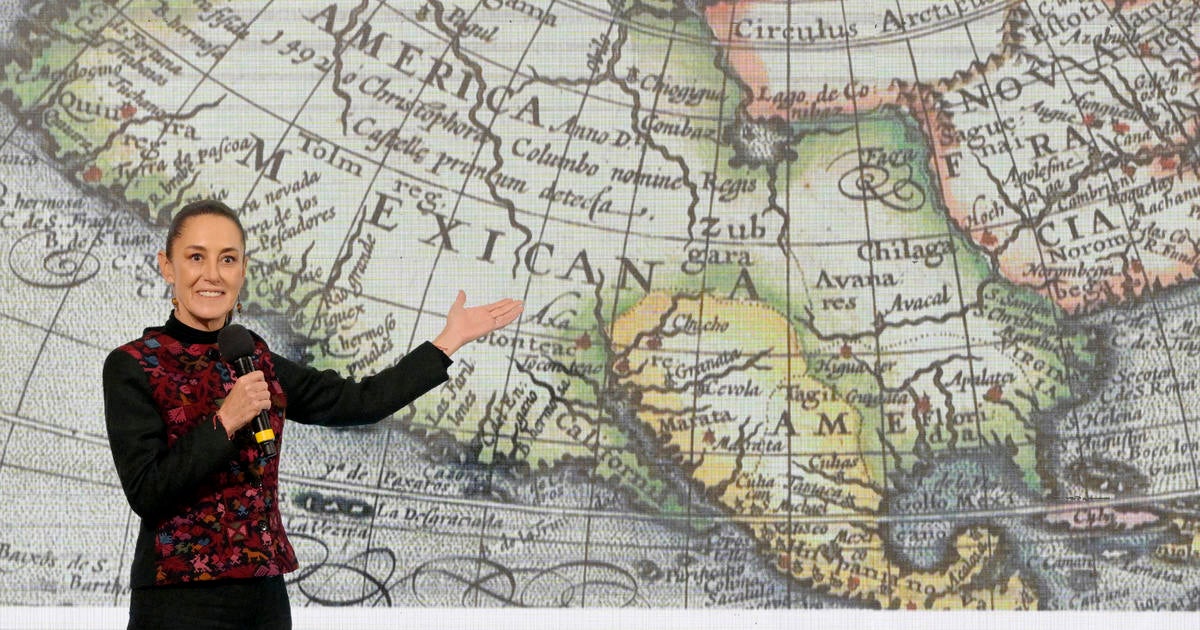
Mexico’s President Claudia Sheinbaum responded sarcastically on Wednesday to U.S. President-elect Donald Trump’s proposal to change the name of the Gulf of Mexico to the “Gulf of America.”
Standing before a 17th-century world map in her daily press briefing, Sheinbaum proposed dryly that North America should be renamed “América Mexicana,” or “Mexican America,” because a founding document dating from 1814 that preceded Mexico’s constitution referred to it that way.
“That sounds nice, no?” she added with a sarcastic tone. She also noted that the Gulf of Mexico had been named that way since 1607.
ALFREDO ESTRELLA/AFP via Getty Images
Trump made the comments during an open-ended Mar-a-Lago press conference during which he also didn’t rule out using military or economic coercion to bring Greenland and the Panama Canal under U.S. control.
“We’re going to be changing the name of the Gulf of Mexico to the Gulf of America, which has a beautiful ring,” Trump said. “That covers a lot of territory, the Gulf of America. What a beautiful name. And it’s appropriate. It’s appropriate. And Mexico has to stop allowing millions of people to pour into our country.”
Trump ally Republican Rep. Marjorie Taylor Greene of Georgia said she would introduce legislation to that effect on Thursday morning.
The exchange has started to answer a larger question lingering over the bilateral relationship between the two regional powers: How would newly elected Sheinbaum handle Trump’s strong-handed diplomatic approach, and promises of mass-deportations and crippling taxes on trading partners like Mexico?
Sheinbaum’s predecessor and political mentor Andrés Manuel López Obrador – who hailed from a similar strain of class populism as Trump, even though he leaned left – was able to build a relationship with Trump as an ally, and his government began to block migrants from going north under U.S. pressure, a boon to Trump.
But it was unclear if Mexico’s first woman president, a scientist and leftist lacking the folksy populism that rocketed López Obrador into power, would be able to build the same relationship.
While Wednesday’s joke quickly ricocheted across social media feeds, it also set the tone for what a Sheinbaum-Trump relationship could look like in the coming years.
“Humor can be a good tactic, it projects strength, which is what Trump responds to. It was probably the right choice on this issue,” said Brian Winter, vice president of the New York-based Council of the Americas. “Although President Sheinbaum knows it won’t work on everything – Trump and his administration will demand serious engagement from Mexico on the big issues of immigration, drugs and trade.”
It comes after other stern but collaborative responses by Sheinbaum regarding Trump’s proposals.
On Trump’s pitch to slap 25% tariffs on Mexican imports, Sheinbaum warned that if the new U.S. administration imposes tariffs on Mexico, her administration would respond with similar measures. She said any sort of tax was “not acceptable and would cause inflation and job losses for the United States and Mexico.”
She’s taken a more concessionary tone on immigration, falling in line with years of Mexican efforts to block migrants from traveling north amid mounting pressure by the U.S.
After originally saying her government would push the Trump administration to deport migrants directly back to their own countries, in January she said Mexico would be open to accepting deportees from other countries, but Mexico could limit it to certain nationalities or request compensation.
Canada also gave a sarcastic response this week to Trump’s recent comments about annexing America’s northern neighbor. According to Canada’s CTV News, Ontario Premier Doug Ford was questioned by a reporter on Monday about Trump’s multi-prong threats to impose a 25% tariff on products from Canada and Mexico in the first hours of his presidency, as well as making Canada the “51st state.”
“You know something, to the president, I’ll make him a counteroffer. How about if we buy Alaska, and we’ll throw in Minnesota and Minneapolis at the same time,” Ford said.



